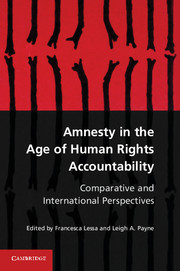Book contents
- Frontmatter
- Contents
- Contributors
- Foreword
- Acknowledgments
- Introduction
- Part I Theoretical Framework
- Part II Comparative Case Studies
- 3 Amnesties’ Challenge to the Global Accountability Norm?
- 4 From Amnesty to Accountability
- 5 Barriers to Justice
- 6 Resistance to Change
- 7 De Facto and De Jure Amnesty Laws
- 8 Creeks of Justice
- 9 Accountability through Conditional Amnesty
- 10 De Facto Amnesty?
- 11 A Limited Amnesty?
- 12 The Spanish Amnesty Law of 1977 in Comparative Perspective
- Conclusion Amnesty in the Age of Accountability
- Bibliography
- Index
- References
4 - From Amnesty to Accountability
The Ebb and Flow in the Search for Justice in Argentina
Published online by Cambridge University Press: 05 June 2012
- Frontmatter
- Contents
- Contributors
- Foreword
- Acknowledgments
- Introduction
- Part I Theoretical Framework
- Part II Comparative Case Studies
- 3 Amnesties’ Challenge to the Global Accountability Norm?
- 4 From Amnesty to Accountability
- 5 Barriers to Justice
- 6 Resistance to Change
- 7 De Facto and De Jure Amnesty Laws
- 8 Creeks of Justice
- 9 Accountability through Conditional Amnesty
- 10 De Facto Amnesty?
- 11 A Limited Amnesty?
- 12 The Spanish Amnesty Law of 1977 in Comparative Perspective
- Conclusion Amnesty in the Age of Accountability
- Bibliography
- Index
- References
Summary
This chapter accounts for the political and judicial processes of accountability that led to the overturning of Argentina’s amnesties and the reopening of trials for human rights violations committed by the military regime that ruled the country from 1976 to 1983. It locates these processes in the broader context of transitional justice in Argentina and examines the role of the main actors involved. The chapter also identifies the key factors that explain the Argentine pathway to accountability and evaluates the extent of Argentina’s uniqueness as the first country in Latin America to overturn domestic legislation shielding perpetrators of grave human rights crimes from prosecution. Looking beyond the region of Latin America, the Argentine transitional justice experience is important since the country has had to struggle with the moral and political dilemmas of justice and order in the context of rapid and uncertain political change, well before the establishment of transitional justice as a distinct academic discipline and field of policy expertise. Moreover, Argentina’s processes have been viewed in the transitional justice literature as an example to be either emulated or avoided. As such, it is important to draw the appropriate conclusions on the basis of a sound understanding of the Argentine experience before evaluating the likelihood and appropriateness of other societies following a similar pathway to accountability.
The Argentine case shows that transitional justice is not a linear process. Political circumstances change as power balances shift and, consequently, the incentives facing relevant political actors change as well. Particularly, in relation to the search for justice, Argentina has gone through an “ebb and flow” process in which the initial opening to judicial accountability of human rights violations was gradually restricted and eventually foreclosed. However, unrestricted prosecution has been reopened almost twenty years after the beginning of the transition to democracy. These developments have occurred due to shifts in the balance of power and motivations of ruling governments, the military, and human rights organizations (HROs), together with broader shifts in the normative environment in which these actors operate, as Kathryn Sikkink points out in her chapter in this volume.
- Type
- Chapter
- Information
- Amnesty in the Age of Human Rights AccountabilityComparative and International Perspectives, pp. 97 - 122Publisher: Cambridge University PressPrint publication year: 2012
References
- 5
- Cited by



